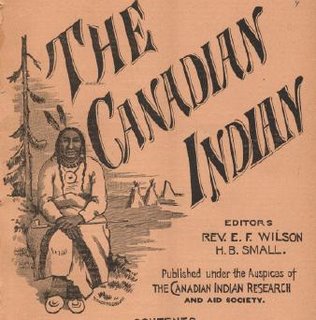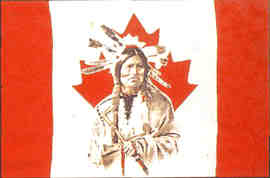Almost a year ago, riots by disaffected and unassimilated black and Muslim youths in France disabused many Europeans of the rosy scenario they harbored about racism in Europe. And, not surprisingly, many white Americans expressed unbridled schadenfreude that these Europeans – who routinely criticized the epidemic of racism in America – were now being singed with the fact of their own racist pathologies. But, in response to those riots, I wrote a cautionary article, here, entitled “World beware: French riots affect us all…”.
Meanwhile, Canadians persisted in oozing nothing but righteous indignation when looking down on the continuing struggle of their Yankee neighbors to deal with race matters almost 150 years after the abolition of slavery. Indeed, one could be forgiven the impression that Canada enjoys complete racial harmony – unblemished by the legacy of slavery that still haunts America or the challenges of racial assimilation that are now coming home to roost all over Europe.
Of course, the reality is that the Canadians have simply managed to quarantine their racial problems more effectively than the Americans or the Europeans. Because, from the time America’s founding fathers codified racism in their constitution, Canadians have been living with their own racial shame.
Over the years, I’ve been obliged to challenge the holier-than-thou attitude many of my Canadian friends assume on racial issues. But my retorts were always premised on the belief that the only reason Canadians could pretend to be without racial prejudice was because there were so few blacks (or other racial minorities) in Canada. Indeed, I often asserted the analogy that Canadians boasting about race relations is rather like Americans boasting about racial integration because one token black enters their neighborhood or joins their country club.
 However, I am embarrassed to confess that, until recently, I did not fully appreciate that Canada’s dealings with native peoples throughout its history have been just as violent and exploitative as America’s. But where the Americans have essentially made peace with their Indians (by settling land claims, making reparations and respecting “sovereign” rights), it seems the Canadians are only now experiencing the rude awakening that their Indians even have grievances.
However, I am embarrassed to confess that, until recently, I did not fully appreciate that Canada’s dealings with native peoples throughout its history have been just as violent and exploitative as America’s. But where the Americans have essentially made peace with their Indians (by settling land claims, making reparations and respecting “sovereign” rights), it seems the Canadians are only now experiencing the rude awakening that their Indians even have grievances.
Alas, despite spending billions annually on Indian welfare programs, the Canadian government has been unable to quell the growing resentment of proud and nationalistic Indians who are fed up with being treated like wards of the state. And the more Indians agitate, the more Canadians seem to realize how woefully inadequate their welfare programs are as remedies to repair centuries of damage (which, of course, only empowers the Indians to agitate more…).
In fact, even though pockets of racial violence relating to land disputes have been sprouting up all over Canada for more than a decade, the situation reached a tipping point this year after restive Indians provoked a violent confrontation when they decided squat en masse on land just outside the sprawling metropolis of Toronto that was slated for development. The Indians claim that this land was given to their forefathers by the British government – as compensation – when they fled with British soldiers to Canada after helping them fight in the American War of Independence.
 More ominously, however, they claim that the Canadian federal government not only breached this agreement but also violated peace treaties guaranteeing Indian land rights and self-governance that were negotiated by their ancestors with the British in the 1700s (i.e. before Indians from the Six Nation Iroquois Confederacy arrived from America).
More ominously, however, they claim that the Canadian federal government not only breached this agreement but also violated peace treaties guaranteeing Indian land rights and self-governance that were negotiated by their ancestors with the British in the 1700s (i.e. before Indians from the Six Nation Iroquois Confederacy arrived from America).
But with over one million Indians no longer content to live in squalid and unsanitary conditions on 600-plus reserves all over Canada, long-unsettled issues of land and political rights will become increasingly confrontational. Indeed, physical and economic peril looms over Canada today because Indians have vowed to file land claims contesting any development of any land outside Canada’s major cities – especially where developers are seeking to exploit lumber, oil, gas and other mineral resources.
O Canada…
NOTE: Unlike Americans who reveled in Frances racial conflagration (and will no doubt do the same when they learn about Canada’s simmering conflicts), I feel only deep concern. Moreover, I hope that Canadians can now turn the moral indignation they directed at America’s racial woes into moral courage to deal with their own (by settling land claims in an equitable fashion and as expeditiously as possible, making reparations where appropriate and respecting Indian sovereign rights consistent with the Canadian Constitution).
This is a file that has been shoved under the rug for 150 years [former Canadian Prime Minister Paul Martin summer 2006]
Canadian Indians, land conflicts
Laban says
“my retorts were always premised on the belief that the only reason Canadians could pretend to be without racial prejudice was because there were so few blacks (or other racial minorities) in Canada.”
or in Winston Churchill’s words (he was describing the shock of the English during WW2 at seeing at first hand the segregation practised in the US army) :
“In countries where there is only one race, broad and lofty views are taken of the colour problem.”